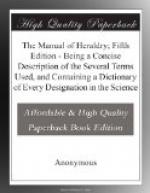REGARDANT. An animal looking towards the sinister
side of the shield.
See LION REGARDANT.
RIBAND. A diminutive of the bend.
[Illustration: Riband]
Ex. Gules, a riband, or.
ROUNDLETS. Small round figures, all named from different metals and tinctures. See p. 8. [CHAP. II.]
RUBY. A precious stone, formerly used instead of gules.
SABLE. The term used in Heraldry for black.
SALIENT. An animal springing forward. See LION SALIENT.
SALTIER. One of the honourable ordinaries, by
Scottish heralds called
St. Andrew’s Cross.
[Illustration: Saltier]
Ex. Argent, a saltier, gules
SANGUINE. One of the heraldic tinctures. It is a dark red or blood colour. By some armorists it is called murrey. The latter word is considered obsolete.
SAPPHIRE. The name of a precious stone, formerly used to express azure.
SARDONYX. A precious stone, formerly used to denote sanguine in emblazoning the arms of the English nobility.
SATURN. The name of a planet, used to denote sable in emblazoning the royal arms by ancient armorists.
[Illustration: Sceptre]
SCEPTRE. A royal staff; an ensign of sovereignty borne in the hand. It was originally a javelin without a head. Sceptres of the present time are splendidly decorated with jewellery. The annexed engraving represents two sceptres of the kings of England: the sceptre with the dove is of gold, three feet seven inches long; the circumference of the handle is three inches, and two inches and a quarter at the end of the staff; the pomel is decorated with a fillet of table diamonds and other precious stones; the mound at the top is enriched with a band of rose diamonds; upon the mound is a small cross of Calvary, over which is a dove with its wings expanded, as the emblem of mercy.
The royal Sceptre with the Cross is of gold; the handle is plain, and the upper part wreathed; it is in length two feet nine inches, the fleur-de-lis of six leaves; the mound, and the cross above it, are richly embellished with amethysts and diamonds.
SCARPE. A diminutive of the bend sinister.
[Illustration: Scarpe]
Ex. Argent, a scarpe, gules.
SCROLL. The riband below the escutcheon, on which the motto is inscribed.
SEEDED. When the seed of a rose or any other flower is of a different tint from the petal, it is called seeded. The heraldic colour of the seed in the centre of a flower is or, but, as in other proper names, the colour of the seed is not mentioned unless it is of a different tincture.
[Illustration: Set foil or Six foil]
SET FOIL OR SIX FOIL. Six leaves conjoined in the centre.
SEGREANT. This term is used to describe a griffin displaying its wings as if about to fly.
[Illustration: Segreant]




